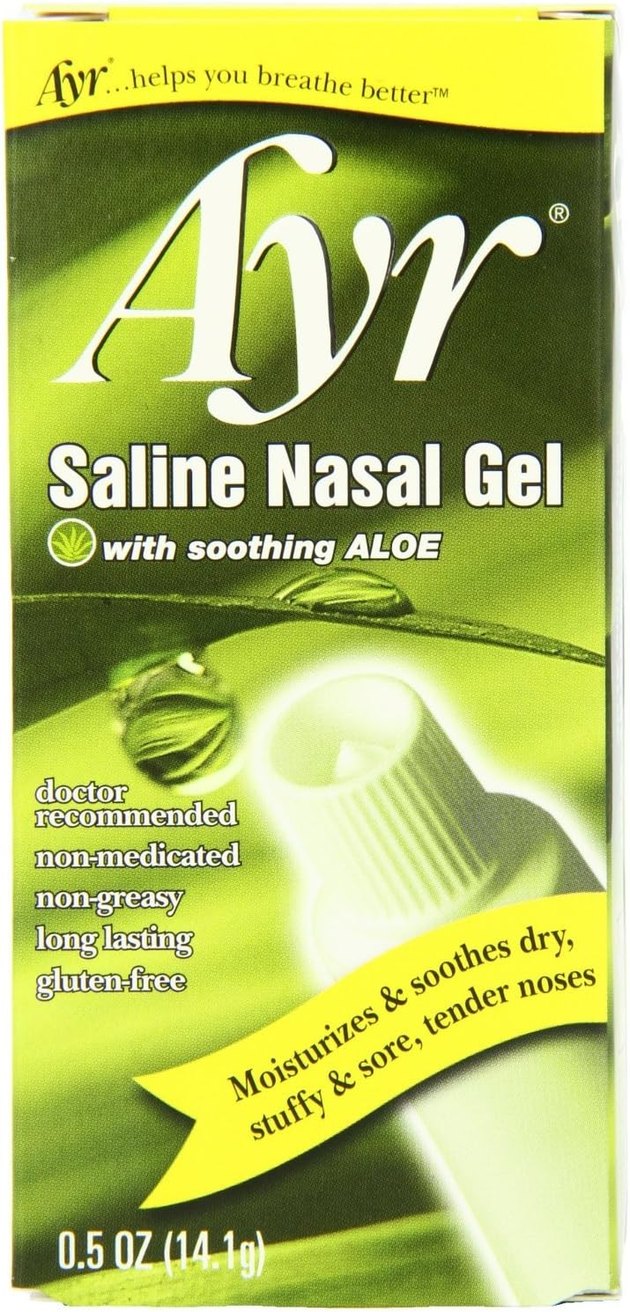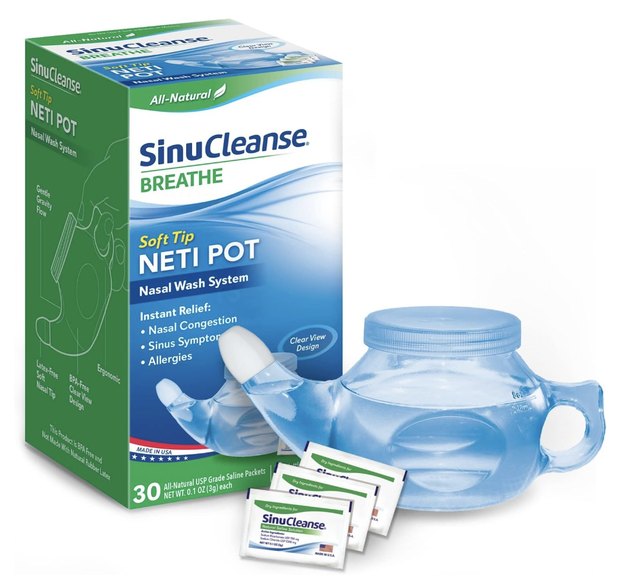
To risk stating the obvious: Winter weather is not kind to your nose.
"The lack of humidity, cold [outdoor] air and forced-air indoor heating dehydrates the mucous membranes inside nostrils," Anthony Del Signore, MD, Director of Rhinology and Endoscopic Skull Base Surgery at Mount Sinai Union Square in New York City, tells LIVESTRONG.com.
Video of the Day
Video of the Day
That can leave you with dry nostrils and sinuses, a sense of congestion, nose crustiness and, yeah, even hard boogers.
Beyond easing the discomfort, you should address a dry nose — rather than just waiting for things to naturally get better when the weather warms up — for your overall health.
"Mucus is an important substance that the body produces to protect itself from foreign substances like viruses and bacteria," Philip Chen, MD, associate professor in otolaryngology-head and neck surgery at the University of Texas Health Science Center at San Antonio, tells LIVESTRONG.com.
It's pretty sticky, which helps it trap foreign particles that can then be removed by the body, and it also has antimicrobial properties that fight infection, he says.
Beyond the cold, dry weather, other causes of a dry nose include smoking, vaping and certain medications, Dr. Chen says. (Add that to an ever-growing list of reasons to consider quitting smoking and seek out the support you need.)
Now, you'll want to know how to treat a dry nose, and how to relieve sinus pressure, to prevent that Sahara-like feeling in your schnoz in the future. Here are the simple steps you can take:
1. Try Saline
Nasal saline sprays and gels "keep nostrils nice and moist," Dr. Del Signore says. How often you'll need to use these will differ for everyone, but spray nostrils as much as needed for comfort, which could be twice a day or every four to six hours, he says.
If you find you have to use nasal sprays all the time, then try a gel, which tends to last longer, Dr. Chen says. A saline gel is preferable to something like olive oil, coconut oil, almond oil or petroleum jelly, he says, which some people try to apply into the nostril via cotton swab.
"This isn't really how it was meant to be used, and you don't want to inhale it into your lungs," he says of these home-based dry nose remedies.
(Also remember to avoid inserting a swab more than a quarter-inch into your nostril. It's still not recommended, but keep this in mind in case you try it anyway because you have nothing else in the house at the time.)
Tip
Stick with saline or antihistamines as nasal spray for your dry nose. If you need to use decongestants like Afrin, use them for only a few days at a time, as your sinuses can get used to the medication and start to rely on it to stay clear, per the Cleveland Clinic.
2. Step It Up to an Rx
If you get dried blood in your nose (looking at you, bloody, crusty boogers), talk to your doctor.
Dr. Del Signore says they may prescribe an antibiotic nasal ointment, which will moisturize nostrils, help your dry, itchy nose and help heal any bacterial infections that may be occurring.
3. Sip Often
Drinking water throughout the day is important for keeping your whole body (including your nose) well-hydrated — even in winter, Dr. Chen says.
Keep a water bottle on hand, and fill it up often. This can also provide some sinus pressure relief.
Tip
Not sure how much H2O to aim for? A good general rule is to drink half your body weight in ounces each day. So, if you weigh 180 pounds, aim for 90 ounces, or about 11 cups.
4. Try Damp Cloths or Wipes
Sometimes applying a warm, wet washcloth to your face can help open up your nasal passages and relieve the feelings of a dry, stuffed nose. You can do this several times a day for relief, per the National Library of Medicine (NLM).
You could even try using a wet wipe or baby wipe to moisten the inside of your nose.
5. Take a Hot Shower or Bath
The steam of a hot shower or bath could help temporarily relieve the feelings of a dry, itchy or even stuffed nose. You can even try sitting in your bathroom while the hot water runs and steams up the room, creating your own "sauna" of sorts, per the NLM.
Try this a few times per day, but be sure not to directly inhale hot steam, as this can feel like your nose is burning, per the NLM.
6. Use a Nasal Rinse
While a Neti pot is typically used for congestion, this form of nasal irrigation may also help relieve a dry nose. Neti pots use saline solution to moisten your nasal passages exposed to dry air, per the FDA.
Be sure to read the instructions before rinsing out your nostrils. And use the solution sold with the Neti pot, or distilled, boiled or sterile water, per the FDA.
7. Keep It Humid
If you have a humidifier attached to your furnace inside your home, check the humidity levels and increase it if necessary.
Otherwise, portable humidifiers can also be helpful to introduce needed moisture into a room, Dr. Del Signore says. This is especially great if you get a dry nose at night, from dry bedroom air, allergies or illness.
Traveling? Dr. Chen recommends hanging wet towels in the room as a dry nose remedy. (Genius!)
8. Look at Your Overall Health
There are certain medical conditions that can make you more prone to the effects of dry nasal passages, including Sjögren's syndrome, a chronic autoimmune disease where your body attacks its own glands that make tears and saliva, according to the U.S. National Library of Medicine. That can lead to dried-out nasal passages.
If you notice other symptoms of Sjögren's, including nosebleeds, frequent sinusitis, a change in smell or taste or dry eyes (among others), talk to your doctor.
Another reason for chronic dry nose is atrophic rhinitis — where a thick crust develops on the inside of your nose. This can be caused by underlying autoimmune conditions, sinus infections and overuse of nasal decongestants, per the Cleveland Clinic. Talk to your doctor if you get this thick crust that comes with an odor, chronic nosebleeds or sinus infections.
If you're looking to get rid of a runny nose, on the other hand, you may need to treat a lingering nasal or sinus infection. (Sometimes, a sinus infection can even feel like you've inhaled water.) Treatment can include antibiotics, nasal sprays, decongestants and simply blowing your nose.
9. Check Your Meds
Another dry nostril remedy to consider is checking whether your medications are causing the issue.
If you suspect a new medication might be causing dryness, get in touch with your doctor, who can review what you're taking and make changes if needed.
Also important to note is that you might mistakenly attribute dry nose to allergies and take antihistamines, Dr. Chen says. These can exacerbate dryness, so talk to your doctor before taking any over-the-counter allergy meds.
How to Prevent and Treat a Dry Nose
Treatment and prevention of your dry nose will all depend on the cause.
If you believe an underlying condition is causing your dry nose, talk to your doctor.
A few ways to prevent dry nose at home can include the following, per OSF Healthcare:
- Keep a humidifier running in your room at night
- Don't sleep with a fan on or directly in your face
- Try taking a warm bath or shower
- Use saline nasal sprays or gels often
- Dry plenty of water
- Use tissues that have moisturizers or lotion in them to relieve soreness
- Use a water-based moisturizer on the insides and around your nostrils
When to See a Doctor for Dry Nose
If you keep asking, "Why is my nose dry?" try one of the above remedies and see if you can bring moisture back to your nasal passages.
If these home remedies for dry nose don't work, make an appointment with your doctor, who can offer stronger dry nose treatments.
This is especially important "if the dryness is associated with recurrent nosebleeds or difficulty breathing through the nose," Dr. Chen says, which may indicate there's a nasal blockage.
Common Questions
Is it OK to put Vaseline in your nose?
Using petroleum jelly (i.e., Vaseline) in your nose for a short amount of time is generally safe. But if you use it all the time, there is a chance it could drain into the back of your nose and be swallowed. From there, small amounts of the jelly can travel into your windpipe and lungs. If you are unsure how long you can use Vaseline on your dry nose, ask your doctor. They can help you determine a safe amount of time, per the Mayo Clinic.
What nutritional deficiency causes a dry nose?
Sometimes a vitamin A deficiency can cause dry, flaky skin, which could include the skin on the inside of your nose. Other common symptoms of a vitamin A deficiency include eye issues (blurry vision), respiratory tract infections, infertility and growth issues in children, per the Cleveland Clinic.
- U.S. National Library of Medicine: “Sjögren’s Syndrome”
- Sjögren’s Foundation: “Symptoms”
- Cleveland Clinic: "This Is Why Your Nasal Spray Stopped Working (and What To Do About It)"
- Aurora Healthcare: "Relief from Dry Nostrils"
- Mayo Clinic: "I've put petroleum jelly on the inside of my nose for years to relieve dryness. Is this safe?"
- Cleveland Clinic: "Vitamin A Deficiency"
- NLM: "Stuffy or Runny Nose"
- FDA: "Is Rinsing Your Sinuses With Neti Pots Safe?"
- Cleveland Clinic: "Atrophic Rhinitis"
Is this an emergency? If you are experiencing serious medical symptoms, please see the National Library of Medicine’s list of signs you need emergency medical attention or call 911.


